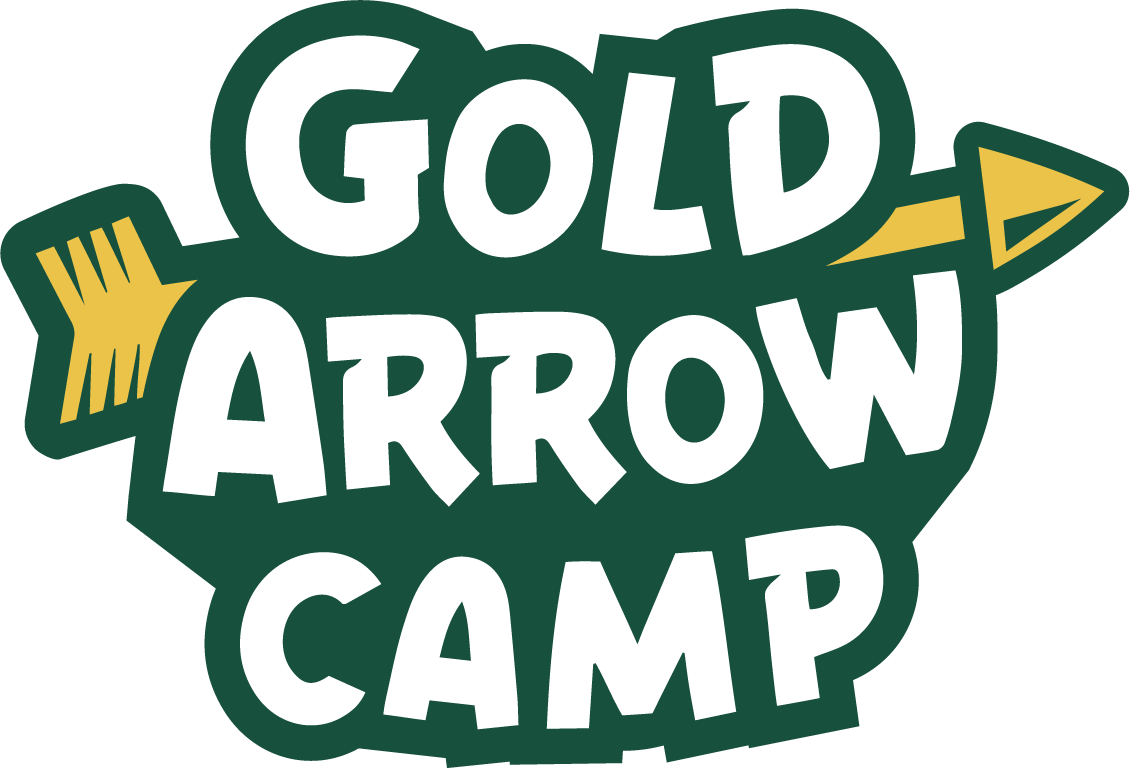May Kindness Calendar
Hello everyone! It’s a new month so that means new opportunities to show kindness to those around us! Click here to download the printable version.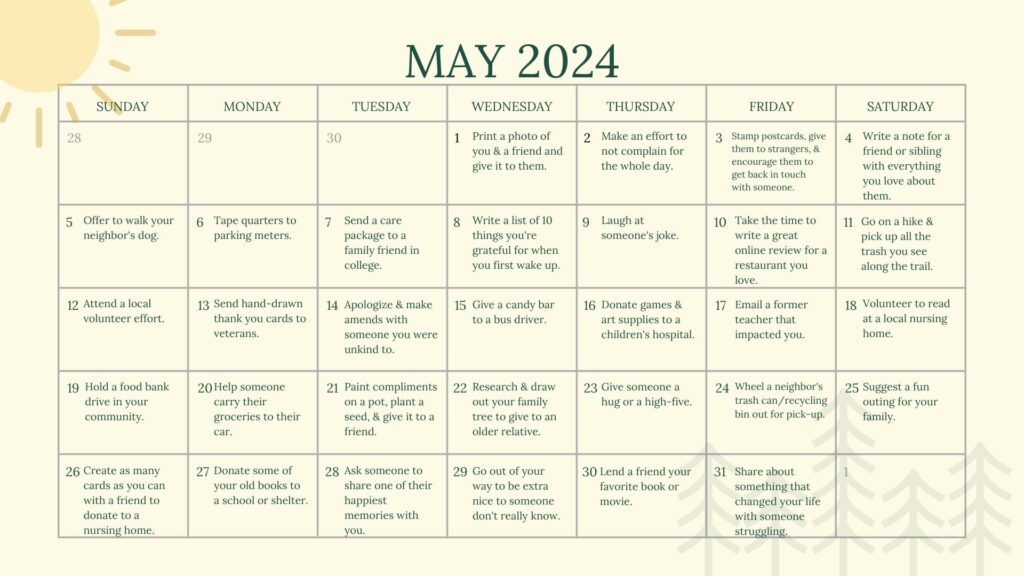
April Kindness Calendar
Take a look at our April Kindness Calendar to spread kindness! Every day is a great day to show people around us that we care! You can download the printable version here.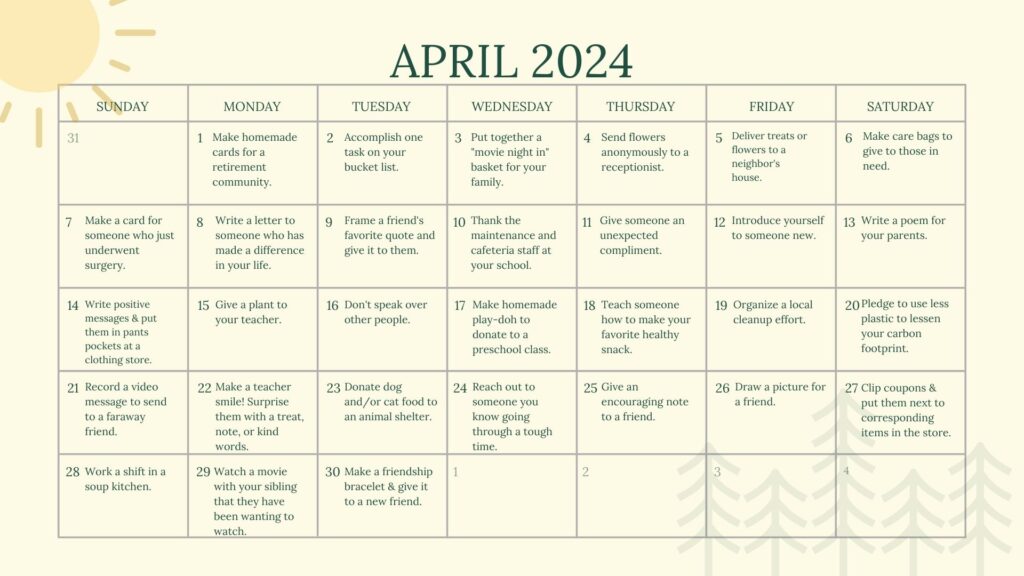
March Kindness Calendar
Hello everyone! It’s a new month so that means new opportunities to show kindness to those around us! Click here to download the printable version.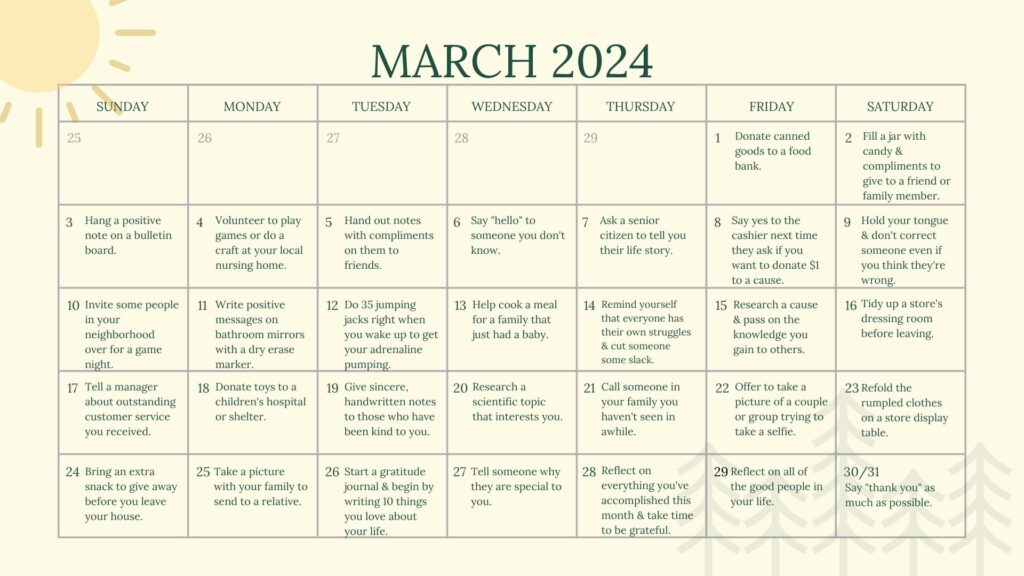
Building Empathy – Our 2024 Summer Theme!
Building Empathy is our 2024 Summer Theme!
Empathy is our ability to understand how others feel, and building our empathy skills are foundational for closer friendships and improved well-being. In a world that is increasingly divided, building empathy is vital to cultivating meaningful relationships with people from diverse backgrounds.
Empathy is a skill that can be practiced, and this summer, we will focus on six tools to help campers cultivate empathy:
- Active Listening
- Emotional Literacy
- Perspective-Taking
- Storytelling
- Disagreeing without Debating
- Being an Upstander
Our logo this year includes a blueprint drawing and construction tools. A blueprint drawing is one of the first phases in planning and design during a construction project. Just as architects must consider various perspectives when designing a building to meet the needs of different users, developing empathy requires understanding and appreciating the perspectives of others. A blueprint also provides a comprehensive plan for a building, considering not just its individual components but how they interact to create a functional and harmonious space. Empathy requires seeing the whole picture by considering the emotions, experiences, and circumstances that shape others’ perspectives and behaviors.
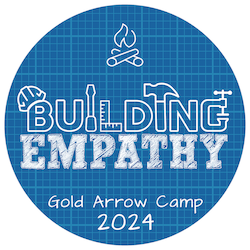
Just as construction tools are used to measure, cut, and shape materials, empathy involves using various “tools” such as active listening, perspective-taking, and emotional literacy to understand others’ experiences, perspectives, and emotions.A well-equipped construction toolkit contains a variety of tools for different tasks and situations. Just as construction tools are used to build structures that connect people and communities, empathy serves as a tool for building bridges and connections between individuals, fostering mutual understanding, compassion, and cooperation.
This summer, we will talk about how we can build our empathy each day at Morning Assembly, and we’ll be adding skills to our empathy “toolkits.” At campers’ nightly cabin campfires, counselors will facilitate empathy-related discussions, and help campers practice active listening and storytelling through daily sharing.
Building Empathy is about putting less emphasis on “me” and more emphasis on “we.” Empathy builders connect with others in meaningful ways and seek to better understand how others are feeling. Our goal is for campers and staff to become empathy builders in their schools, workplaces, and communities.
Our theme this summer builds many of our past themes related to gratitude, kindness, kindness (Cool 2B Kind), relationship building (Creating Connections), helpfulness (Give a Hand), grit (Growing Grit), positivity (The Energy Bus), a focus on friendship (Find-a-Friend), building up others (Filling Buckets), being our best selves (Be You), appreciating our community (Better Together), and Choosing Kindness (2022).
We can’t wait to build our empathy skills together this summer!
February Kindness Calendar
Happy February, everyone! This month is full of love and good feelings! We are so happy to share 29 (whoa!) awesome ways to spread kindness to/with your friends and family. You can download the printable version here.
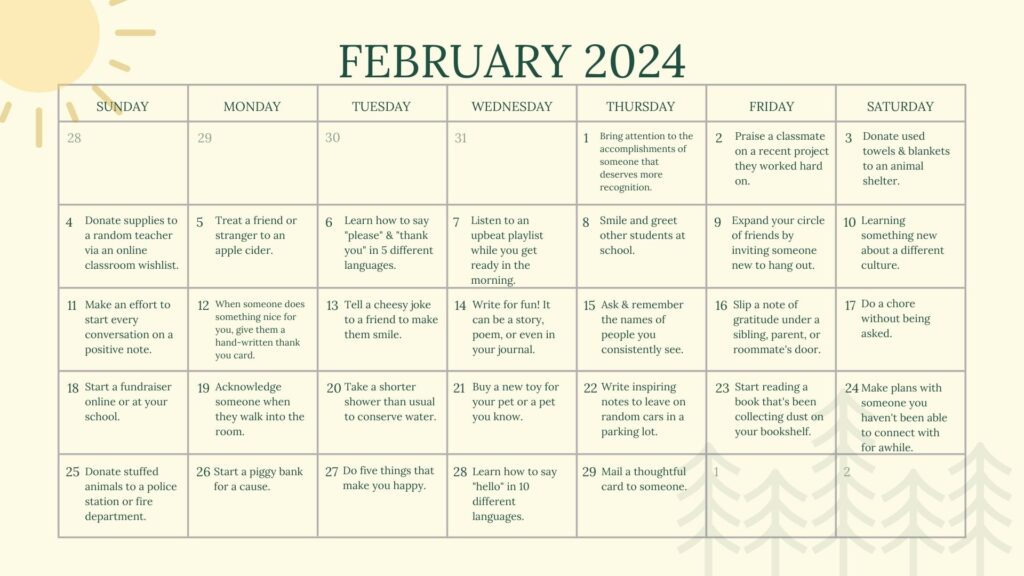
Start the Year with Some GAC Goals
January is a great time to reevaluate priorities and set goals for the new year. One way to help children and young adults establish a strong commitment to a goal is to create a goal as a family. The Gottman Institute states, “Families who make goals together, keep goals together,” and Kelsey Down explains the benefits of creating a family goal:
“Many of our routines are built around work and family, but your autonomy and ability to make personal changes to your life can be undermined by your greater responsibilities. So if you want to exercise more or eat healthier, you are more likely to do so if your other family members exercise with you and eat the same things you do. But if you are the only one in your family that is actively working towards a goal, constantly removing yourself from your other family members’ habits (e.g. eating a salad during family pizza night) will eventually erode your desire to keep your resolutions. You might stick with eating salads for a while, but that pepperoni pizza will be more tempting when everyone else is enjoying it but you. You shouldn’t force your family to do what you’re doing, especially if they don’t want or need to, but you can easily find ways for you and your family to work together and achieve a common goal.”
If you want your children to unplug more or spend more time in nature, consider creating a goal in which everyone participates equally as a family, and framing the goal as a SMART goal (specific, measurable, achievable, relevant, and time-bound).
After two weeks (or more!) at Gold Arrow Camp, many campers are motivated to continue some of their camp habits – like using their phone less or practicing the friendship skills they used at camp. January is a great opportunity to refocus on some of those practices and intentions. In Audrey “Sunshine” Monke’s book Happy Campers, Audrey writes about the power of bringing the magic of camp (and the habits we learn while going to camp) home. Here are five ideas inspired by our healthy habits at GAC to help your family come up with a family goal for 2024.
1. Complete the 1,000 Hours Outside Challenge!
1,000 Hours Outside is a “movement to reclaim childhood, reconnect families, and live a fuller life.” The goal is to spend 1,000 hours outside in one year. 1,000 Hours Outside has free tracker sheets that are available to download. There are many benefits to spending time outside, however the National Wildlife Federation found that the average American child spends four to seven minutes in unstructured outdoor play each day. As a family, brainstorm ways to spend more time outside in 2024! Every Kid Outdoors provides families of 4th graders with free passes to all of the national parks. Create a list of different national parks, trails, hikes, local parks, and places to visit as a family, or plan a bigger outdoor adventure and go on a family camping trip!
2. Come up with fun, screen-free activities and set screen-time limits as a family.
Decide what would work best for your whole family (both parents & kids!), and come up with parameters that you agree on as a family. Maybe everyone agrees to plug in and turn off their phones by 8pm each night, or you could download an app that helps everyone in your family monitor their screen time and social media usage and create a family challenge (maybe with prizes!) for whoever uses their screens the least. In Happy Campers, Audrey shares a great conversation format for talking about screens with your children. As a family, consider brainstorming fun screen-free activities that you want to do together in 2024, for example, a card game every Wednesday night, or a hike or bike ride together every Sunday. Write your ideas down and post them somewhere you’ll see them, or create a checklist so you can check off as you try each person’s suggestions.
3. Set a family reading goal.
At Gold Arrow Camp, counselors read to campers every night (even our oldest campers!). Talk about which books each family member is going to read this year, or establish a daily or weekly time when your family reads together. For younger children, select a chapter book to read as a family. Make visiting the local library part of your weekly routine. My family enjoys following each other on Goodreads (a reading social media platform). When we see each other in person, we have lots of great conversations about what we’re reading and give each other book recommendations.
4. Establish a sharing practice.
At Gold Arrow Camp, campers share their highs and lows, or something else about their day, every night at campfire. In Happy Campers, Audrey discusses the benefits of daily sharing. Find a time for your family to connect and share each day. This could be sharing highs and lows, or responding to a different question each night at dinner. If evenings are busy, find a time when you are consistently together as a family (breakfast, right before bed, in the car) and establish a routine of sharing, listening, and connecting with each other!
5. Pick a theme for the year!
Each year at Gold Arrow Camp, we choose a summer theme. In 2023, our theme was Count on Me, and we talked about ways we can be more dependable and reliable people! Here is more information on choosing a family theme.
More Resources:
*Free PDF Download* Screen Time: 3 Steps to a Successful Family Meeting
The Gottman Institute: Make Your New Year’s Resolutions a Family Affair
How Nature Can Make You Kinder, Happier, and More Creative
10 Surprising Things Kids Learn at Camp
I would not be the person I am today without camp.
-15-year-old camper
My three decades of camp experience, coupled with my own and others’ research, have shaped my long-held opinion that camp experiences benefit children in profound ways. Yet even I was astounded by the revelations shared at our closing campfires last summer for the campers who were completing their final seasons as campers. These campfires were an emotional time to say goodbye to our high school kids heading into 10th grade.
After their counselors spoke about each of them and shared words of affirmation and encouragement, I asked the kids if they wanted to share anything they had learned at camp they might use throughout their lives. I knew we had a special gig going at camp, and that we were providing a positive, healthy community where kids could have fun, make friends, and grow, but I hadn’t heard the specific life lessons that they believed they learned at camp in such direct and heartfelt words spoken out loud.
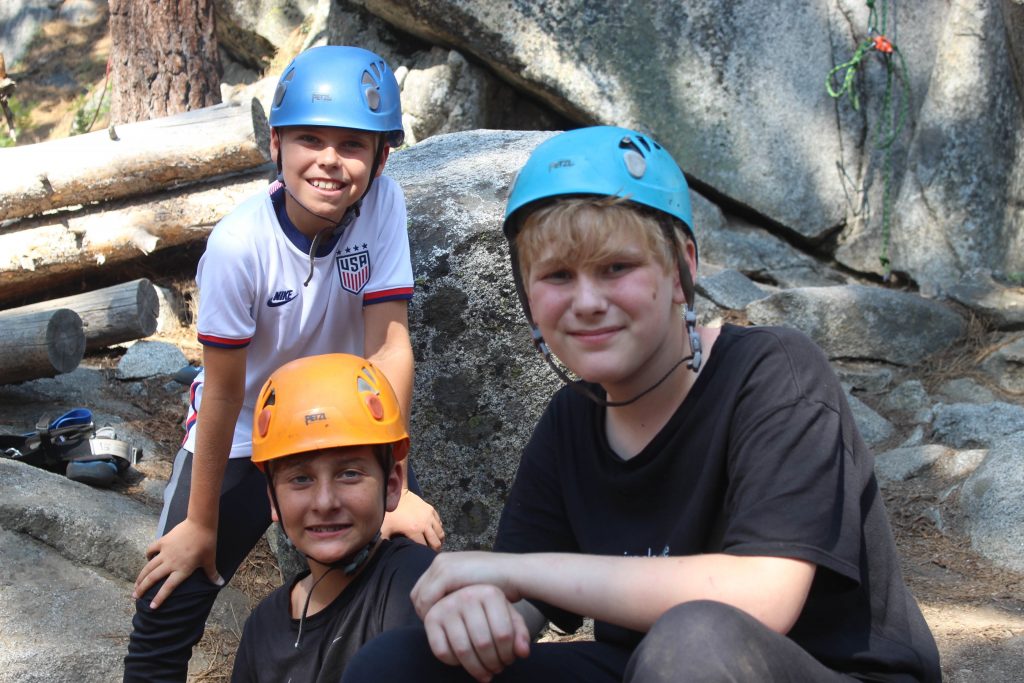
Our oldest campers shared that they learned how to be happy, “to just have fun and not worry so much.” In a time when so many young people struggle with depression and anxiety, it was heartwarming to hear that, for many of them, camp is their “happy place.”
Campers also said they learned to be happy in their own skin, gaining confidence in their abilities, speaking up for things they believe in, and worrying less about what others think of them. “I have the freedom to be myself,” said one. Added another, “When I am at camp, I am a better version of myself than anywhere else on Earth.”
Being their truest selves, they found, paved the way for them to meet new people and explore new friendships. “Camp has made me a more open and caring person,” said one. At camp, many said they experienced a sense of belonging they didn’t always feel in their schools.
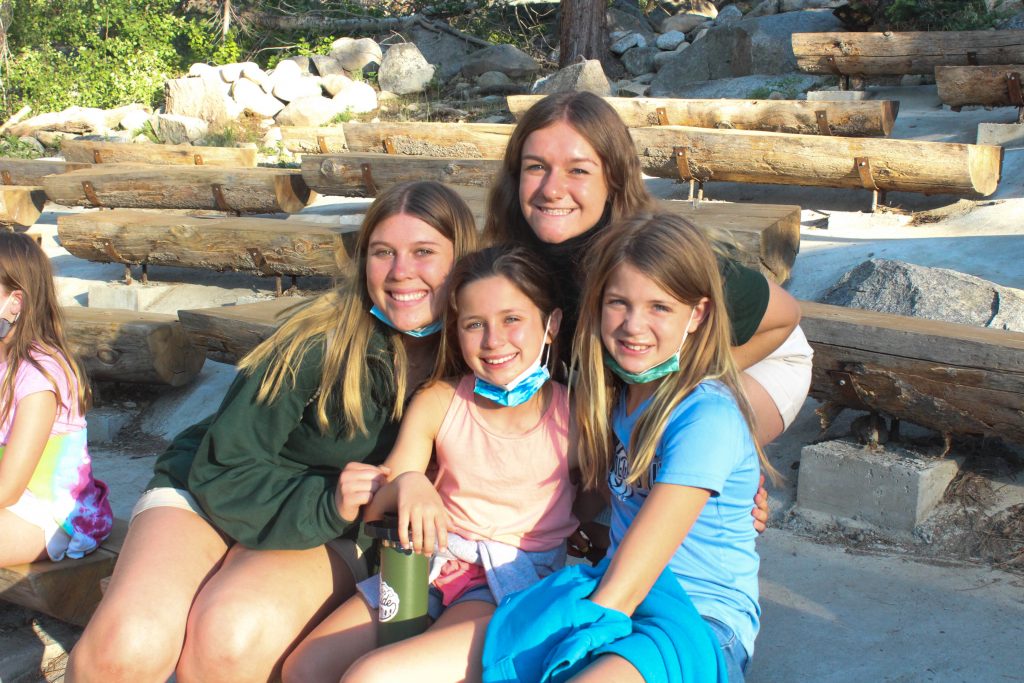
This comfort at camp enabled them to take risks and conquer fears, and they challenged themselves in new and adventurous ways. It didn’t matter if they failed, they said, because they were surrounded by counselors and friends who supported them no matter the outcome. “I’ve learned that the magic happens,” said one, “outside of your comfort zone.”
But among the sentiments that cheered me most from those older campers was the idea that camp helped them learn to live in the moment, to enjoy where they were in the Great Outdoors, and not worry about what the future held. Said one, “I found a passion for the outdoors I thought I would never have.” That’s what tends to happen, of course, when kids are unplugged from their technology for a time. Experiences and relationships are more vibrant and real, and kids expressed how great it was to connect face-to-face.
I really loved the way one camper put it: “When I was put in a cabin group with seven other random girls, we bonded really well and didn’t judge each other before we got to know them, because we had never seen each other’s social media profiles.”
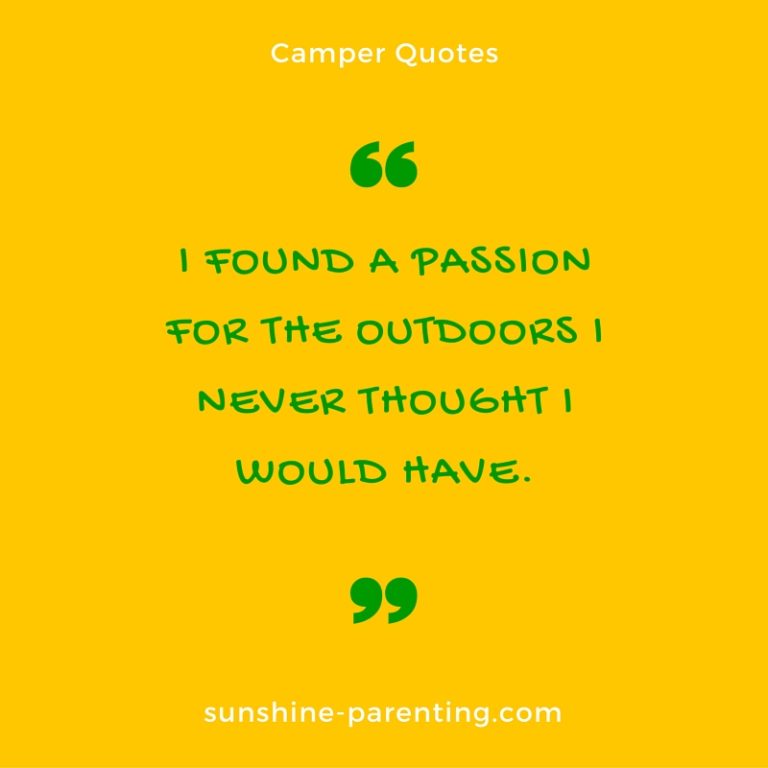
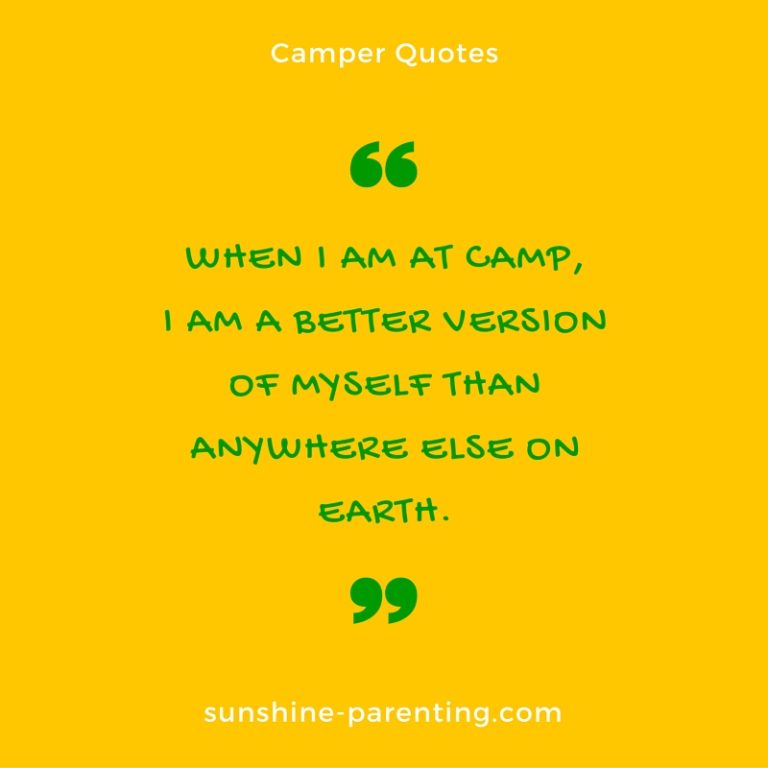
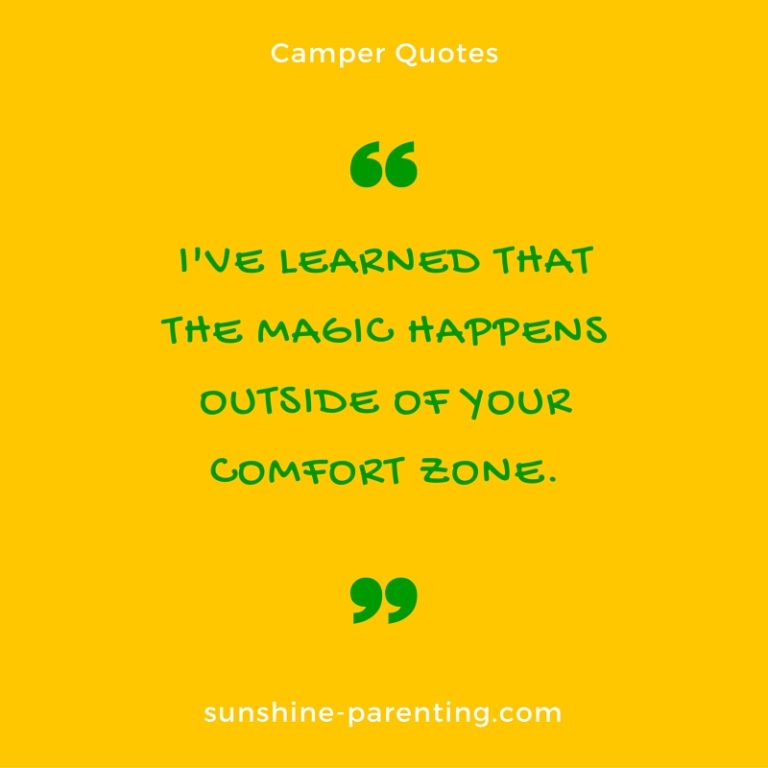
I reflect back on those and other words and see that these 15-year-olds have wisdom that many adults have yet to acquire. Truly, I was blown away by what they said they learned at camp, and I could see in their spirits what one of them expressed: “Being at camp has influenced me to be a better person who wants to be a leader, not a follower.” I feel honored to know these articulate, honest, and thoughtful young adults who do not fit the teenage stereotype and are far more mature than I was at their age. These kids chose sleeping outdoors and sitting around a campfire instead of hunching over their phones.
When I look back on those memorable campfires, I feel deep gratitude for our oldest campers, the life-changing experiences they had at camp, and that I had the opportunity to play a small role in their learning. I am also grateful for the parents of these kids who were willing to share time with their children, and a piece of their childhoods, with our camp. And I am reminded, as a parent, that although there are many things I want my kids to learn—and I’d love to be their teacher—many of their best lessons will come from experiences apart from, and from someone other than, me.
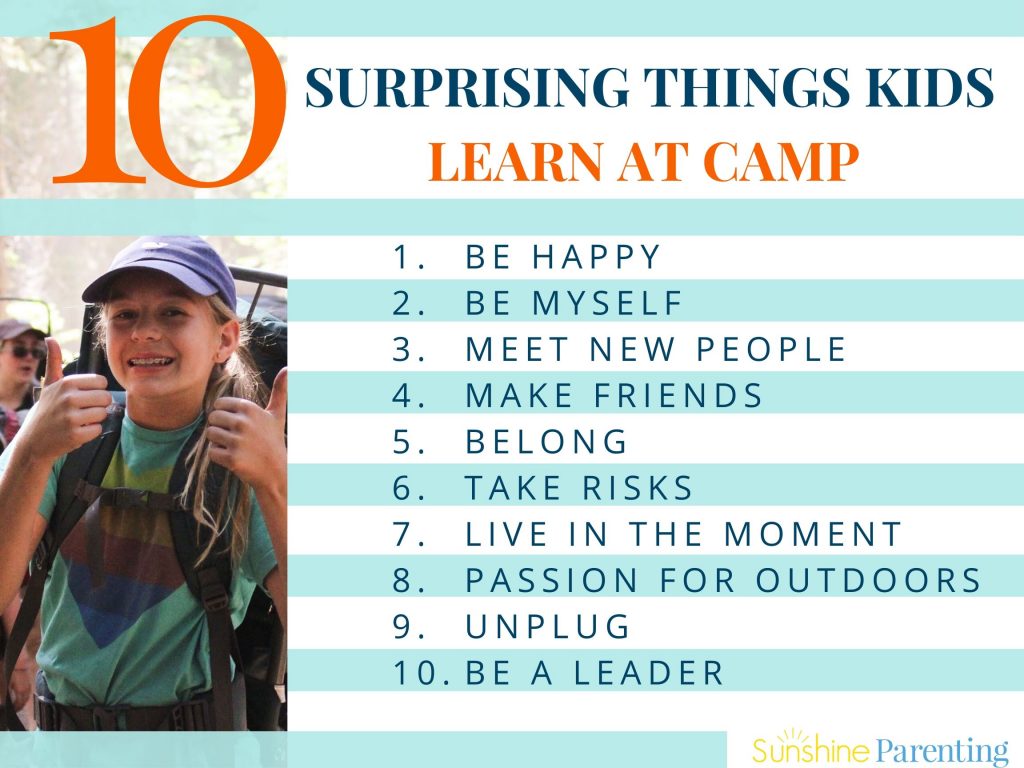
Article originally published at Sunshine Parenting.

Audrey “Sunshine” Monke, MA, has been the owner of Gold Arrow Camp since 1989 and currently serves as the Chief Visionary Officer. In addition to her vision-casting and mentoring at GAC, Sunshine is an author (Happy Campers: 9 Summer Camp Secrets for Raising Kids Who Become Thriving Adults), podcast host, speaker and coach on the topics of parenting, social skills, and happiness. Find out more at her website, Sunshine Parenting.
Visit Sunshine Parenting for more summer camp-related posts & podcast episodes.
January Parent Coffee

Want to bring some of the fun, connection, and character and skills growth of GAC home to your family this year? Grab your coffee or tea, login, and join other GAC parents for our first parent coffee of 2024! We’ll learn about and discuss simple, research-based and experience-backed strategies covered in HAPPY CAMPERS for bringing some camp strategies home to your family.
Get your copy of Happy Campers!
Audible
Kindle/Print
Audrey “Sunshine” Monke, who will be speaking at this coffee, is Gold Arrow Camp’s Chief Visionary Officer, the author of Happy Campers: 9 Summer Camp Secrets for Raising Kids Who Become Thriving Adults, and the host of the Sunshine Parenting Podcast. Audrey regularly speaks to parents and teachers on the topics of friendship skills, connection, and well-being. See some of her past interviews and events here.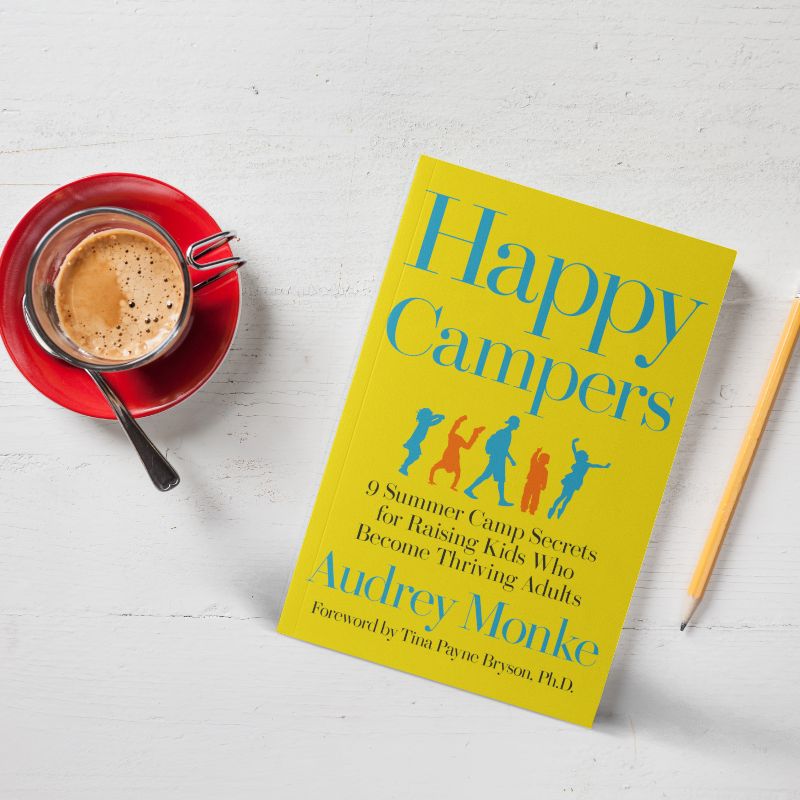
Fresno Jingle Bell Run
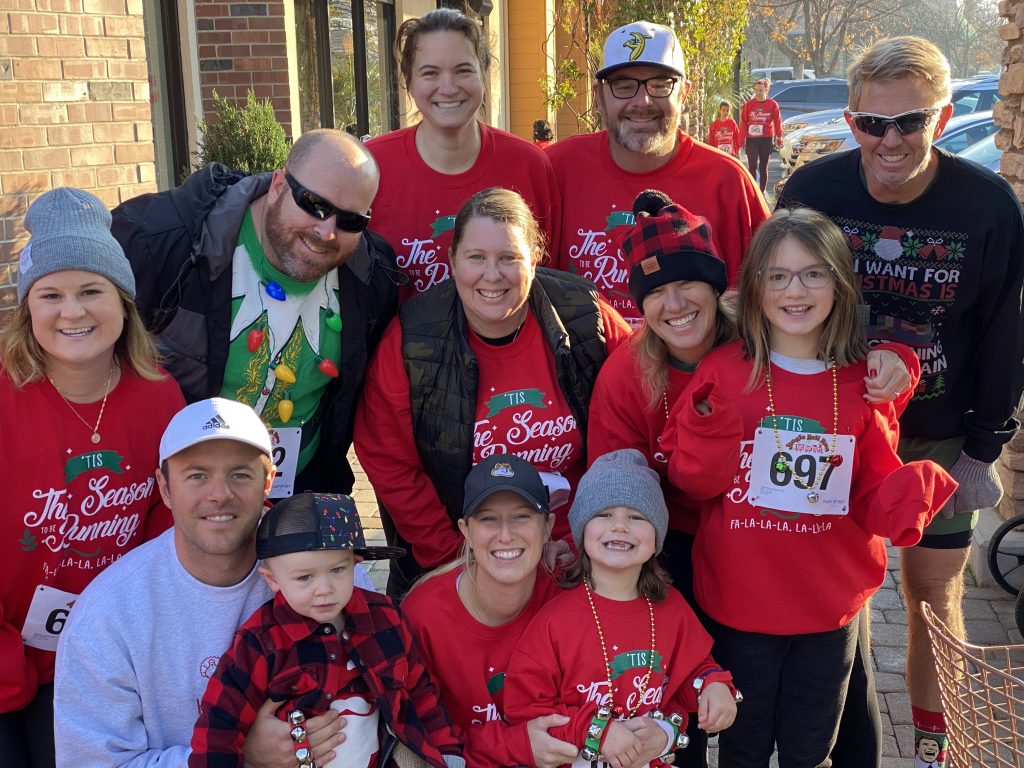
Want to bring some of the fun, connection, and character and skills growth of GAC home to your family this year? Grab your coffee or tea, login, and join other GAC parents for our first parent coffee of 2024! We’ll learn about and discuss simple, research-based and experience-backed strategies covered in HAPPY CAMPERS for bringing some camp strategies home to your family.
Get your copy of Happy Campers!
Audible
Kindle/Print
Audrey “Sunshine” Monke, who will be speaking at this coffee, is Gold Arrow Camp’s Chief Visionary Officer, the author of Happy Campers: 9 Summer Camp Secrets for Raising Kids Who Become Thriving Adults, and the host of the Sunshine Parenting Podcast. Audrey regularly speaks to parents and teachers on the topics of friendship skills, connection, and well-being. See some of her past interviews and events here.

Jingle Bell Run is Coming!
The GAC Runners will once again convene on Christmas Tree Lane in Fresno, California for their participation in the Fresno area Jingle Bell Run on December 9, 2023! We invite all Central California GAC families (and those that may be in the area) to join us for the 5K run or 2 mile walk. The run and walk both benefit Toys for Tots.
All registered participants get a sweatshirt AND will get to see their GAC family while there! We will meet at 8:30am at the Starbucks in Fig Garden for a group photo before walking over to the starting line. The run and walk will begin at 9:00am. Please let us know if you’ll be able to join us so that we can keep an eye out for you and your family!
Click here to register for the Fresno Jingle Bell Run and join team Gold Arrow Camp! We hope to see you there.
What are the GAC Runners? Click here to find out more about GAC Runners.
Apologizing Well
Because all of us make mistakes in our relationships, an important friendship skill is learning how to apologize sincerely and effectively. Apologizing well when we hurt a friend with our words or actions is a skill we’re working on growing this summer at GAC.
In just about every conflict, the disagreement or issue is never ALL one person’s fault. Usually both people did or said something that hurt the other person. With campers, we brainstorm examples of conflicts they get into with friends – often minor things like disputes over card games or using an item that belongs to someone else without asking. Sometimes, we unintentionally hurt a friend.
Apologizing well includes owning up to mistakes and apologizing for words or actions that hurt another person. A sincere and thoughtful apology is the most effective way to resolve conflicts with friends & family members.
Conflicts are a normal part of all relationships, so we are normalizing for campers that all of us – at times – need to apologize to our friends. These are the simple steps to making a meaningful apology when we’ve done or said something we regret or that has hurt our friend.
6 Steps to a Good Apology
-
Use the words, “I’m sorry.”
-
Acknowledge exactly how you messed up.
“I used unkind words that hurt your feelings.”
-
Tell how you were feeling and why you think you did the thing.
“I was feeling jealous of how well you did at wake boarding, so I made an unkind comment.”
-
Tell the person how you’ll fix the situation.
“I’d like to share some things that I really admire about you so that you understand how much I like you. And I’m going to take a breath before I make impulsive comments.”
-
Promise to behave better next time.
“I’m going to do my best to not blurt out unkind things. If I mess up, I want you to tell me.”
-
Ask for forgiveness.
“Will you forgive me for messing up your card game?”
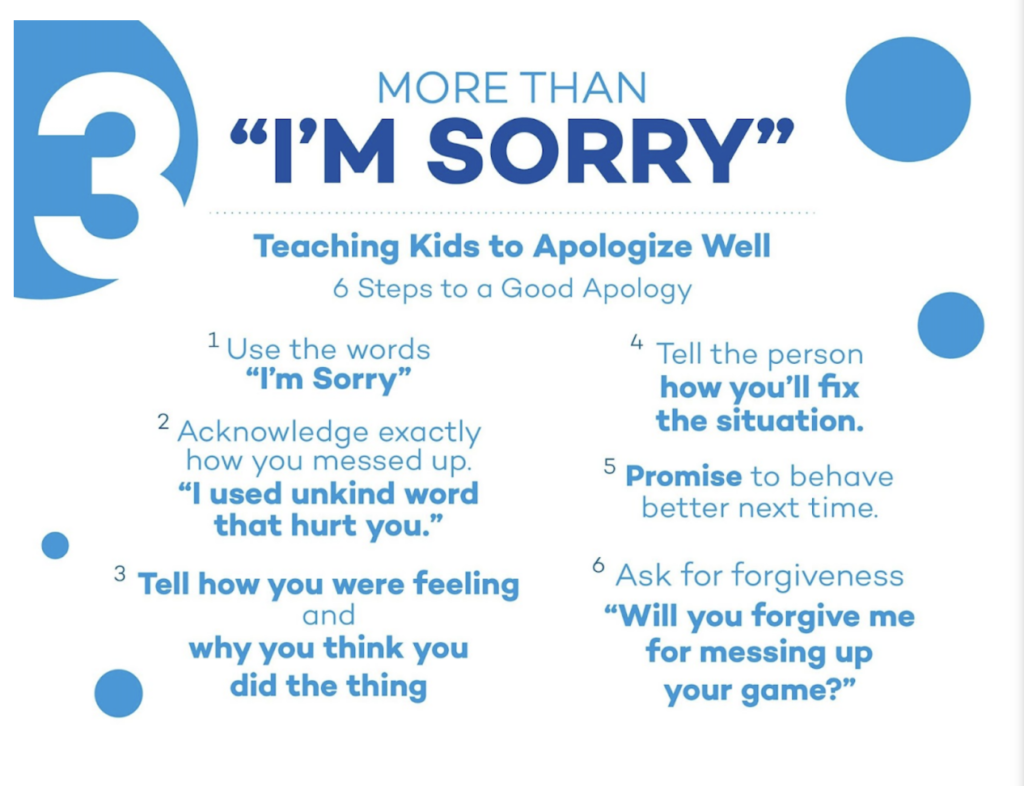
Resources/Related
